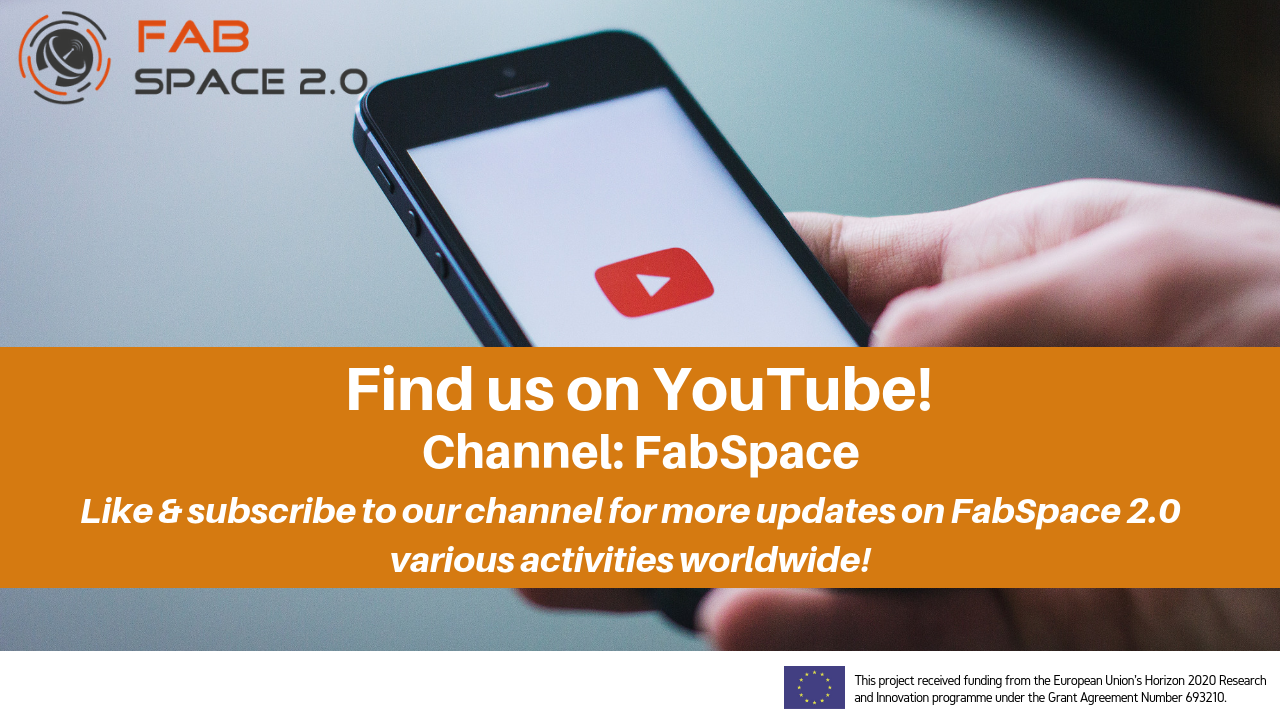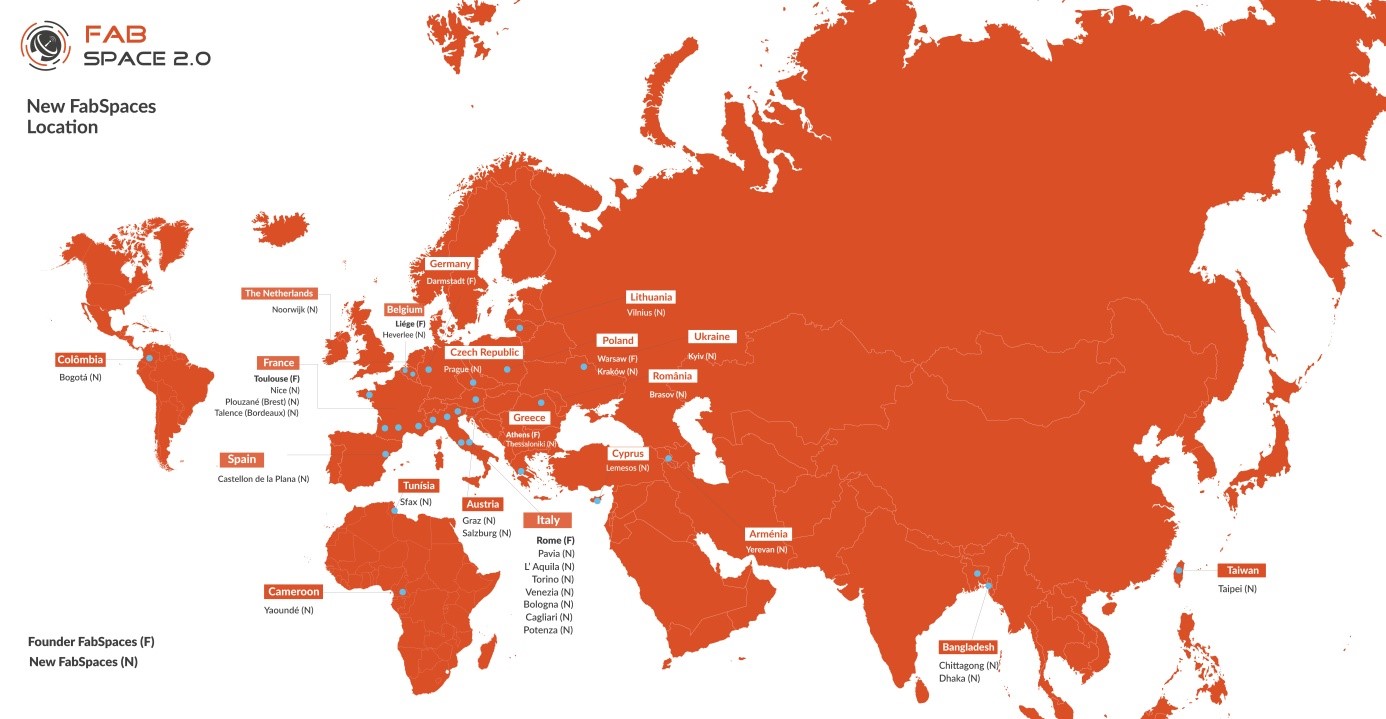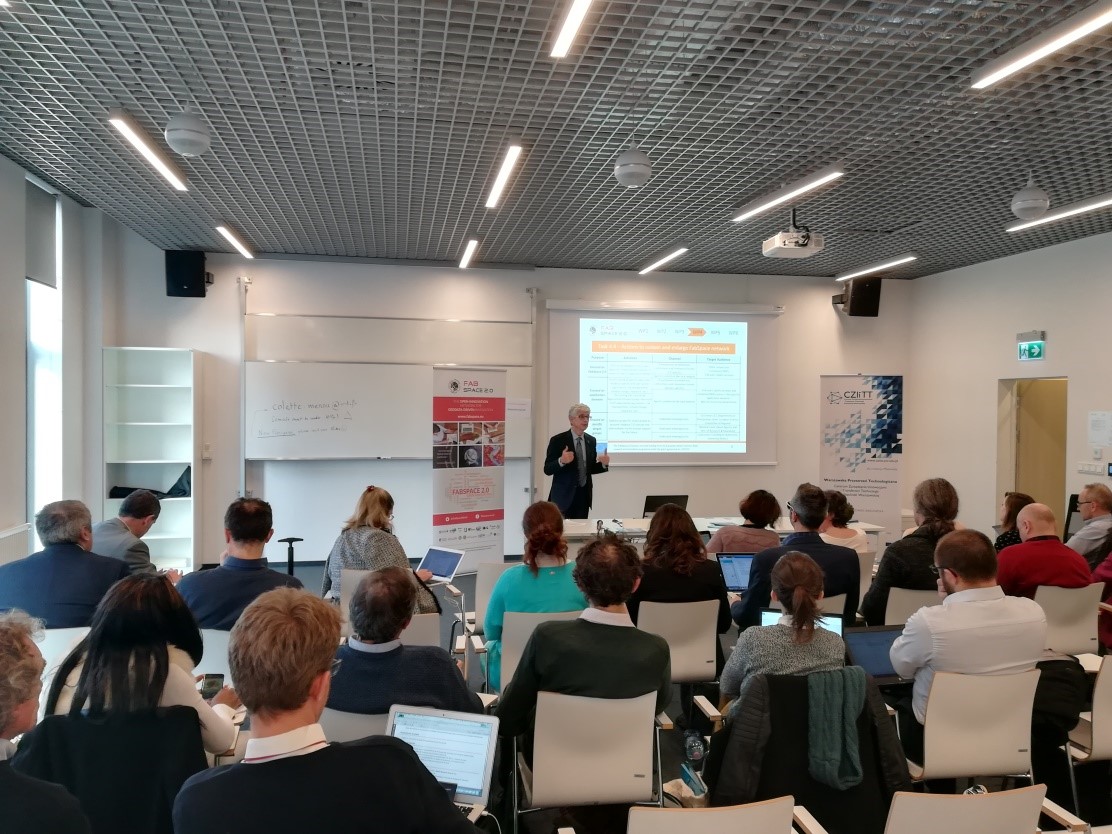FabSpace 2.0 videos on its various activities worldwide are now available at YouTube
5 December 2018
The FabSpace 2.0 project announced the launch of its official YouTube channel (http://bit.ly/FSChannel). The channel aims to showcase various activities from various FabSpace locations worldwide.

The videos that are featured in the channel include: FabSpace activities or events; interview of students, researchers, etc.; description of ongoing project with an overview of their work; concrete application and use cases (e.g. introducing an app, a tool, etc.); interview with users; and tutorials.
Specifically, this YouTube channel is part of the activities foreseen within the project´s work package (WP) 4 - Exploitation and dissemination, which are implemented throughout the entire lifetime of the project. It is the central activities for the exploitation, maintain sustainability, and disseminate the FabSpace daily activities.
We encourage everyone to subscribe to FabSpace 2.0 YouTube channel to be updated regularly with the project activities and real-life application.
About FabSpace:
FabSpace 2.0 is the open-innovation network for geodata-driven innovation – by leveraging Space data in particular, in Universities 2.0.
Its Work programme topic addressed INSO-4-2015: Innovative schemes for open innovation and science 2.0 b) Academia- Business/Public/CSO knowledge co-creation Coordination and support action. The FabSpace 2.0 project aims at making universities open innovation centres for their region and improving their contribution to the socio-economic and environmental performance of societies.
To achieve these general objectives, the FabSpace 2.0 project offers to concentrate on one research area with high expected socio-economic impact: data-driven innovation, with a particular attention to Earth observation data.
In the six European regions covered by the consortium, partner universities work together with co-located Business Incubation Centres of the European Space Agency (ESA BICs). ESA BICs aim at inspiring entrepreneurs to turn space-connected business ideas into commercial companies, and provide technical expertise and business-development support.
This consortium, completed by TerraNIS – the French company that operates the European Group of Enterprises for a Network of Information Using Space (EUGENIUS) – and IDGEO – provisioning continuous trainings in Geomatics – and the European Business Network (EBN), will be a key success factor for the project.
In addition, FabSpace 2.0 had selected 29 new FabSpaces until 2018 located in various countries worldwide including Armenia, Austria, Bangladesh, Belgium, Cameroon, Czech Republic, Cyprus, Colombia, France, Greece, Italy, Lithuania, Poland, Romania, Spain, Taiwan, The Netherlands, Tunisia, and Ukraine. These new FabSpaces expanded the FabSpace 2.0 network from its first founder FabSpaces in France, Belgium, Germany, Italy, Greece, and Poland.
This project began on March 1st 2016 and will last 3 years. It is under the lead of Univ. Toulouse III – Paul Sabatier (UPS). For more information, visit https://www.fabspace.eu.
FabSpace 2.0 Launched the Additional 15 International Networks during the ESA Earth Observation Φ-week in ESA-ESRIN, Italy
15 November 2018
The FabSpace 2.0 project today launched its international network expansion with 15 new FabSpaces located in various countries worldwide during the ESA Earth Observation Φ-week which is held on the 12th - 16th of November 2018 in ESA-ESRIN, Italy. The Φ-week event (http://phiweek.esa.int/) is organised by The European Space Agency (ESA) focusing on EO Open Science and FutureEO and aimed to review the latest developments in Open Science trends and kick-start innovative activities of the recently created Φ-department looking at FutureEO, and its associated Φ-lab aiming to identify, support and scale bold EO ideas.
The 15 new FabSpaces complement the existing 20 FabSpaces and will help consolidating the FabSpace 2.0 project’s mission all over the world, disseminating the services and helping to address the needs of final users of Earth Observation and geodata-based applications. This year international expansion is the continuation from the last year first expansion and had achieved the FabSpace´s goal to be extended worldwide.
"It is so exciting to think that the 6 founders FabSpaces and the 14 new FabSpaces that joined in January 2018 - half of them being now open - are now welcoming in November 2018 the 15 extra new FabSpaces! We can now be confident in the expansion and the sustainability of the FabSpace 2.0 international network on a global scale", said Josiane Mothe from University Toulouse III – Paul Sabatier (UPS), the Coordinator of FabSpace 2.0.
The application opening had started from July this year and the selection process took place on October. After going through a selection process, the consortium and the External Advisory Board of FabSpace 2.0 selected 15 new FabSpaces to contribute in highlighting the achievement of European space programmes and thereby European space data and broadcast a standard to foster open innovation in Universities 2.0 and possibly develop new applications and services enabled by space related data.
A local University or Educational Institutions compose each new FabSpace. The new FabSpaces will be opened at the beginning of 2019 and are joining the existing FabSpace 2.0 network. The new 15 FabSpaces are:
|

Figure 1. 35 International FabSpaces Networks
Marcello Maranesi from University of Rome Tor Vergata, leader of the FabSpace 2.0 network dissemination said “During the application opening Aurélie Baker (from Aerospace Valley) and myself actively interacted with Universities from several countries for better introducing the FabSpace 2.0 concept and approach and we also learned a lot about their activities and future plans, so we are now ready to start working with them”.
In addition to the launching of the network, FabSpace 2.0 founders are mentoring the FabSpaces networks and providing assistances and technical supports in implementing the platform and activities under FabSpace framework.

Figure 2. FabSpace Founders and New FabSpaces at the ESA Earth Observation Φ-week in ESA-ESRIN, Italy. From left to right: Fabspace Bangladesh/Chittagong - Mohammad Shahadat Hossain; Fabspace Toulouse - Jhoana Benavides; Fabspace Colombia/Bogota - Jose Fernando Jimenez Vargas; Fabspace Toulouse - Philippe Lattes & Josiane Mothe; FabSpace Italy - Marcello Maranesi; Fabspace Belgium - Antony Bievelez; Fabspace Italy/Cagliari - Maria Teresa Melis; Fabspace Ukraine - Nataliya Borotkanych; and Fabspace Romania - Mihai Ivanovici.
Each new FabSpace is expected to offer a “Space Science Shop” service, that collects the needs and the societal challenges of external stakeholders (Civil Society Organisations, Public Authorities and Companies), linked to application domains of EO and satellite navigation uses (i.e., Agriculture and Forestry; Energy; Environment and resource efficiency; Intelligent Transport Systems; Smart cities; Health and well-being). The scope is to provide independent participatory research support in response to concerns experienced by external stakeholders, offering a demand-driven and bottom-up approach to the FabSpace facility and screening questions provided by these stakeholders.
The FabSpace 2.0 network is also organising activities such as Open Days, Innovation Events (e.g. Hackathons, Start-Up Weekends, App Camps), workshops and conferences, bootcamps and many other open events as part of the project. The new FabSpaces are welcome to replicate them in their country/region and participate to the FabSpace 2.0 European innovation events and contests. Additionally, they can participate in the bootcamps organised by the other FabSpaces networks.
About FabSpace:
FabSpace 2.0 is the open-innovation network for geodata-driven innovation – by leveraging Space data in particular, in Universities 2.0.
Its Work programme topic addressed INSO-4-2015: Innovative schemes for open innovation and science 2.0 b) Academia- Business/Public/CSO knowledge co-creation Coordination and support action. The FabSpace 2.0 project aims at making universities open innovation centres for their region and improving their contribution to the socio-economic and environmental performance of societies.
To achieve these general objectives, the FabSpace 2.0 project offers to concentrate on one research area with high expected socio-economic impact: data-driven innovation, with a particular attention to Earth observation data.
In the six European regions covered by the consortium, partner universities work together with co-located Business Incubation Centres of the European Space Agency (ESA BICs). ESA BICs aim at inspiring entrepreneurs to turn space-connected business ideas into commercial companies, and provide technical expertise and business-development support.
This consortium, completed by TerraNIS – the French company that operates the European Group of Enterprises for a Network of Information Using Space (EUGENIUS) – and IDGEO – provisioning continuous trainings in Geomatics – and the European Business Network (EBN), will be a key success factor for the project.
In addition, FabSpace 2.0 had selected 29 new FabSpaces until 2018 located in various countries worldwide including Armenia, Austria, Bangladesh, Belgium, Cameroon, Czech Republic, Cyprus, Colombia, France, Greece, Italy, Lithuania, Poland, Romania, Spain, Taiwan, The Netherlands, Tunisia, and Ukraine. These new FabSpaces expanded the FabSpace 2.0 network from its first founder FabSpaces in France, Belgium, Germany, Italy, Greece, and Poland.
This project began on March 1st 2016 and will last 3 years. It is under the lead of Univ. Toulouse III – Paul Sabatier (UPS). For more information, visit https://www.fabspace.eu.
FabSpace 2.0 becomes an official patronage of 2018 International Summer School on Atmospheric and Oceanic Sciences (ISSAOS 2018) organised by the Center of Excellence for the Forecast of Severe Weather by Remote Sensing and Numerical Modeling (CETEMPS), University of L’Aquila, Italy
11 June 2018
This month, FabSpace 2.0 officially announced the new patronage activities for the 2018 International Summer School on Atmospheric and Oceanic Sciences (ISSAOS 2018) to be held on the 27th – 31st August 2018 in L’Aquila, Italy and is organised by the Center of Excellence for the Forecast of Severe Weather by Remote Sensing and Numerical Modeling (CETEMPS), University of L’Aquila, Italy, which is also one of the new launched FabSpaces international network. The purpose of the school is to illustrate the progress that has been made in the scientific ability to generate detailed climate projections at the regional scale. The theoretical lectures will be complemented by practical sessions on real environmental data analysis, and there will be ample opportunity to exchange ideas and questions among the students and the lecturers.
The main objectives of the school are thus to provide students with an insight into climate changes and impacts, as well as to associated uncertainties and their communication. Assessments on the most recent techniques for climate data analysis, for regional climate modeling techniques, for climate impact on hydrology and for quality assessment and validation of the observations will be provided.
The topics of the programme includes: Global change: overview of the climate system; Climate change impacts: analysis of the impacts at global and regional scale; Climate change uncertainties: and their communication overview of the uncertainties and role of communication; Regional climate modeling: RCM techniques; Climate impact on hydrology: impacts of the climate changes on hydrology; and Climate data analysis: techniques for climate data analysis.
The school is open for undergraduate and graduate (masters or doctoral) students and staffs (permanent or non-permanent). The school fees included lunch and coffee breaks at school location, social events (including ice breaker, city tour, and social dinner), and teaching materials. The school will be held at L’Aquila town. It is a Middle Age town, rich of art, history and wild nature. It is the capital city of Abruzzo and is located at an elevation of 2.341 feet (714 meters), in a valley dominated by the highest mountain of the Appennines, the Gran Sasso d’Italia. L’Aquila is located between the National Park “Parco Nazionale del Gran Sasso e Monti della Laga” and the Re-gional Park “Parco Naturale Regionale del Sirente-Velino”. It is about 100 km East of Rome.
Interested registrants are welcomed to register and the early-bird registration deadline is on June 20th, 2018. Attendants are also invited to contribute to the school´s poster session by submitting their posters. In addition, there will be a 100€ discount for participants from FabSpace institutions. To do so, type the word "FabSpace" in the field "Other special requests" of the online registration form (http://cetemps.aquila.infn.it/issaos/index.php/registration-2018/#form).
To register and find out more about ISSAOS 2018 please visit: http://cetemps.aquila.infn.it/issaos/
Vilniaus universiteto Chemijos ir geomokslų fakulteto Geomokslų institutas tapo FabSpace 2.0 tinklo dalimi
FabSpace 2.0 yra geoduomenų naudojimu paremtas inovacijų skatinimo tinklas. Didžiausias dėmesys tinkle skiriamas duomenų, gautų iš kosmoso panaudojimui. Žemės stebėjimai ir palydovinės navigacijos suteikia daug galimybių šalyse ir veiklos srityse, kur antžeminės informacijos kiekis yra ribotas.
2017 metų pabaigoje prie FabSpace tinklo prisijungė ir Vilniaus universiteto Geomokslų institutas. Šiuo metu tinklą sudaro 14 mokslo ir inovacijų institucijų. 2018 m. sausio 31 d. Varšuvos Technologijos universiteto Inovacijų ir Technologijų sklaidos centre vyko pirmas jungtinis FabSpace 2.0 projekto senbuvių ir naujų narių seminaras, skirtas pasidalinti patirtimi.
Seminare dalyvavo FabSpace atstovai iš Prancūzijos, Italijos, Čekijos, Ispanijos, Lietuvos, Armėnijos, Kipro, Nyderlandų ir Kamerūno. Tokio tipo susitikimai rengiami kasmet. FabSpace 2.0 projekto koordinatorė Josiane Mothe iš Paul Sabatier - Toulouse III universiteto (UPS) pažymėjo: „Labai džiaugiuosi, kad prie projekto prisijungė nauji nariai. Panašu, kad nauji nariai labai motyvuoti ir aš tikiu, kad jie sėkmingai prisidės prie FabSpace idėjos sklaidos. Nauji FabSpace nariai atstovauja įvairioms sritims, yra skirtingose šalyse, o tai labai svarbu plečiant FabSpace tinklą ir jo idėjas“.
Seminaro metu akcentuotos trys svarbiausios tinklo veiklos sritys: inovacijos, verslumo skatinimas ir nuotoliniai stebėjimai. FabSpace 2.0 projekto tikslas yra skatinti inovacijas panaudojant Žemės stebėsenos palydovų duomenis, bei ieškoti bendradarbiavimo galimybių tarp universitetų, pilietinės visuomenės, verslo ir viešojo sektoriaus. Šio tikslo siekiama organizuojant mokymus, seminarus, inovacijų konkursus, atviras dienas skirtas skleisti žinias apie nuotolinius stebėjimus visuomenei.
Pradėjusios savo veiklą naujos narės galės teikti „Kosmoso mokslo erdvės“ paslaugas, skirtas įvertinti įvairių verslo ir viešųjų organizacijų Žemės stebėjimų ir palydovinės navigacijos poreikį, sprendžiant skirtingų sektorių (pvz., žemės ūkio, miškininkystės, energetikos, Aplinkos ir efektyvaus išteklių naudojimo, išmanios transporto sistemos, išmaniųjų miestų, sveikatos) iššūkius, bei teikiamas perspektyvas. Siekiama skatinti duomenų gautų iš kosmoso naudojimą ir tiekti pagalbą integruojant juos į įvairių sektorių veiklą. FabSpace 2.0 konsorciumas yra pasiryžęs teikti pagalbą naujai įkurtoms FabSpace narėms, tarp jų ir Vilniaus universiteto Geomokslų institutui. Su naujų FabSpace narių sąrašu galite susipažinti FabSpace 2.0 projekto svetainėje.
Daugiau informacijos apie FabSpace 2.0 Geomokslų institute galite gauti susisiekę su mumis adresu.

1 pav. FabSpace 2.0 seminaras, kuriame prie FabSpace 2.0 tinklo pirmą kartą prisijungė keturiolika naujų narių
Apie FabSpace
FabSpace 2.0 yra geoduomenių naudojimu paremtas inovacijų skatinimo tinklas. Didžiausias dėmesys skiriamas duomenų gautų iš kosmoso panaudojimą skatinant inovatyvius sprendimus įtraukiant Universities 2.0 tinklo narius.
Fabspace 2.0 tinklas siekia koordinuoti ir teikti pagalbą įgyvendinant Horizon 2020 programos temos „INSO-4-2015 Inovatyvūs sprendimai inovacijoms ir mokslui 2.0“ veiklą „b) Akademinė bendruomenė – Verslas/ Visuomenė / Nevyriausybinės organizacijos bendras žinių kūrimas“. Fabspace 2.0 siekia paversti universitetus regioniniais atvirų inovacijų centais ir skatinti jų indelį į socialinę ir ekonominę visuomenės gerovę. Siekiant šio tikslo Fabspace 2.0 savo veiklas telkia į potencialiai didelį socialinį ir ekonominį poveikį galinčią padaryti sritį: Nuotolinių žemės stebėjimų duomenimis paremtas inovacijos.
Universitetai iš šešių Europos regionų dirba kartu su Europos Kosmoso Agentūros Verslo inkubavimo centrais (ESA BIC). ESA BIC siekia skatinti verslininkus pradėti su kosmosu susijusias idėjas paversi pelningomis kompanijomis ir teikti joms techninę ir su verslo vystymu susijusią pagalbą.
FabSpace 2.0 priklauso TerraNIS , Institut de développement de la géomatique (IDGEO) ir European Business Network (EBN). TerraNIS yra „European Group of Enterprises for a Network of Information Using Space“ (EUGENIUS) narė. IDGEO – geomatikos vystimo institutas, teikiantis tęstinį mokymą geomatikos srityje. Šių narių indėlis užtikrina sėkmingą projekto eigą.
FabSpace 2.0 pradėjo veiklą 2016 m. gegužės 1 d. ir vyks 3 metus. Projekto lyderis yra Paul Sabatier - Toulouse III universitetas (UPS). Daugiau informacijos rasite https://www.fabspace.eu.
